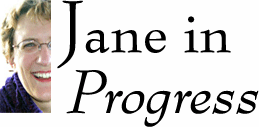 |
|
 |
 |
Looking for tips and tricks to the art of writing for television? Welcome to the blog of experienced television writer Jane Espenson. Check it out regularly to learn about spec scripts, writing dos and don'ts, and what Jane had for lunch! (RSS:  ) |
|
|
Home » Archives » March 2006 » Make 'em Laugh!
[Previous entry: "Lying Down for Fun and Profit!"] [Next entry: "A Treat!"]
03/16/2006: Make 'em Laugh!
Have you noticed the change in the air, that certain feeling that a new season is upon us? That's right. It's Pilot Season! Table reads are busting out all over!
A table read is a pre-filming exercise in which the actors sit around a table and read the entire script out loud. Writers and executives listen and use what they have heard to improve the script. When a table read is held before a pilot, it's usually the first time that the actors have all assembled together, so you're also looking for how they mesh together as an ensemble.
These events aren't just called "table reads" out of tradition. There really is a big table at the center of the room. Usually just the actors, director and executive producers are actually seated the table. A wider circle of chairs surrounds the table. Everyone else, including non-exec-prod writers, sit in these chairs. This means that when you become a staff writer, you will spend some time looking directly at the backsides of a cast of actors. This often means you are privileged to an array of thong underpants. Try to stay focused.
Comedies always have table reads. Dramas sometimes do. (Gilmore Girls does. Buffy didn't.) What I'm going to talk about applies to comedies and the funniest of the dramas. If you're writing a 24, you don't have to worry too much about this.
There's an interesting thing that happens when an episode goes from being an script to being an oral performance: subtler aspects become clear. A joke that seemed hilarious on the page can feel heavy-handed when performed, while a subtler moment that just sort of sat there when read silently, can get a big laugh at the table. This effect gets even more pronounced when the actors get up on their feet on the stage. At Gilmore Girls and at Ellen, those two shows in particular, I was struck by how a subtle actress could take a simple observational moment and make it the biggest laugh at the table or at a run-through, with a tone of voice or a facial expression. When you're working on a show, it's worthwhile to remember that sometimes the funniest moments aren't the hard jokes that shine like diamonds on the page.
But here's the rub. You, as a young writer just starting out, are not writing a script to be performed. You're writing a spec. All you have is the page. This is one of the ways in which the spec script system is imperfect. Really subtle emotional writing will be noticed, but really subtle joke writing might very well simply fade into the page. Use those produced scripts you've acquired as your guides for how many jokes to have on a page, and for how "jokey" those jokes should be. But if there's any question in your mind, I would err toward the ha-ha-ha side.
In my opinion, it is probably better to be considered a funny writer who might have to be reined in, than to be considered a writer who will have to be pushed toward the funny.
Note to Nicole in Germany: I lost your address and cannot send you a script. Sorry! Check out scriptcity.net to order a Gilmore Girls in pdf form. You can even get one that I wrote! Thanks for the letter!
Lunch: Spicy noodles with pork from Noodle Planet, a wonderful place near UCLA. Noodle Planet. Even the name is satisfying.
|
|
|
 |
|
Get Blog Updates Via Email
|
|
 |

